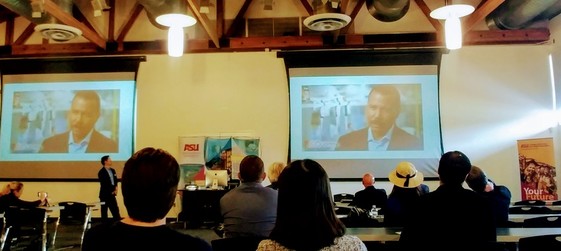 Chris Yoo, Systems Imagination, raising the issue of genetic modification. Chris Yoo, Systems Imagination, raising the issue of genetic modification. On the same day that I attended ASU's Hacking the Human conference and Expo, I attended the Arizona Speaker Series where I heard former Vice President Joe Biden state that many significant changes and scientific advancements over the past few decades have come through academic research. With ASU's College of Nursing and Health Innovation's (CONHI) and HEALab's event, I got the opportunity to see how the Valley's entrepreneurs have benefited from ASU's research and support to drive much-needed advancement in health care. The local start-ups and researchers on the agenda talked about health care trends enabled by big data, cloud, artificial intelligence (AI), virtual and augmented reality and the internet of things (IoT). To kick things off, Chris Yoo, whose firm Systems Imagination develops algorithms used in Artificial Intelligence applications, brought up the issue that is top of mind related to Hacking Humans - Gene-edited babies? Should there be a boundary set for innovation in health care? On the use of artificial intelligence to solve health care problems, George Runger, Ph.D. and chair of the Department of Biomedical Informatics, spoke of Gartner's trough of disillusionment and the challenge of integrating new technologies with clinical workflows and other factors that cause new technology to lose its luster. Moving on to where Phoenix start-ups are making traction, Kent Dicks of Life 365, is using AI integrated with mobile health solutions to create opportunities for personalized health incentives that will lead to greater patient engagement. Joe Hitt of GoX Studio had a fantastic example of how wearable robotics make it possible for robot-assisted physical productivity that reduces the risk of workplace injury. R&D company, Saccadous, uses virtual reality eye-tracking technology to inexpensively diagnose, research or track such things as Traumatic Brain Injury (TBI), Alzheimer's, Parkinson's, and the effectiveness of ADHD medications. The solution that blew me away was AdviNow's self-guided healthcare clinic that is being piloted with Akos Med Clinics in Safeway with plans to roll out to 50 Arizona locations by June 2019. The solution integrates AI that provides a probabilistic diagnosis with an augmented reality application that guides the patient through the use of FDA approved diagnostics tools (blood pressure cuff, thermometer, pulse oximeter, and others) to create a self-guided patient visit to assist in streamlining the patient intake and diagnosis process. The AI assisted diagnosis is submitted to a telehealth physician who sees the patient to work out a care plan or next steps. The automation is expected to eliminate much of the time that they spend today on documentation so Physicians can spend more time with the patient, even if virtually. AdviNow's solution partnership with Safeway and Akos exemplifies a point made by Kent Dicks of Life 365 "people want to consume healthcare on their terms" and "solutions have to be fully integrated." For mobile health, Life 365's solutions and collaborations are just that: fully integrated. Additionally, Dicks believes that to be successful, mobile health solutions outside of the hospital have to be disposable so that the provider/payer does not have the cost and overhead of managing equipment returns. After the conference, I perused the poster boards ASU's CONHI freshman class presented on their innovative solutions to healthcare problems. I was excited to see all of the extremely well thought out solutions presented by FRESHMAN students to today's health care problems. So I think that Joe Biden is right, we will see advancement in healthcare driven by the next generation of innovative thinkers and supported by advanced educational systems.
0 Comments
Your comment will be posted after it is approved.
Leave a Reply. |
Janet Kerbyis passionate about empowering organizations to re-imagine and revolutionize their business through digital transformation. Janet helps clients develop value driven digital transformation strategies that start with the question of "why"and gets realized through solid strategies for around "what" and "how". Archives
January 2019
|

 RSS Feed
RSS Feed